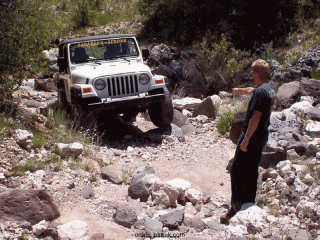Whether simply spotting a novice driver in a stock Jeep over his first bump, or recovering an upside-down rock crawler from the bottom of a steep, narrow ravine, follow the same guidelines to ensure as safe a progression as possible.
1. Safety always comes first.
Keep the situation in the proper perspective throughout the event: machines are replaceable, lives are not. Unless there is imminent danger to someone’s personal safety, it is best to resist the temptation to spring into action. Take a few moments to thoroughly analyze the situation from several different perspectives and compose a mental list of possible courses of action.
2. Establish the leader for the situation.
This is a critical and frequently bypassed step among recreational 4-wheelers who find themselves in situations requiring assistance. The worst situation is when everyone is yelling out orders at the same time. Even if they are not conflicting, it is still distracting and counter-productive. Conversely, a situation where no one speaks up is also confusing and counter-productive.
Establish ONE person to lead everyone throughout the situation. All ideas, opinions and actions are discussed with this person prior to action.
Generally, the run leader, the driver of the vehicle or the person with the recovery equipment is running the show in a spotting or recovery situation. This should not be assumed in every situation. Ultimately, the driver of the vehicle is responsible for his own rig, therefore he is responsible for selecting the person to help him. He should approve any decisions or course of action with regard to his rig. What matters most is that the driver can communicate well with the designated leader, and has an acceptable level of trust for his or her judgment and direction.
Many times, on group runs, a spotter will already be in place to help each member of the group through. As the driver, you choose whether to accept this person’s spotting, or designate a spotter of your own. Who is selected as the spotter is not a judgment of 4-wheeling skills, but of a person’s communication skills with the particular driver. No one should be offended by being offered spotting, or by the selection of a different spotter.
